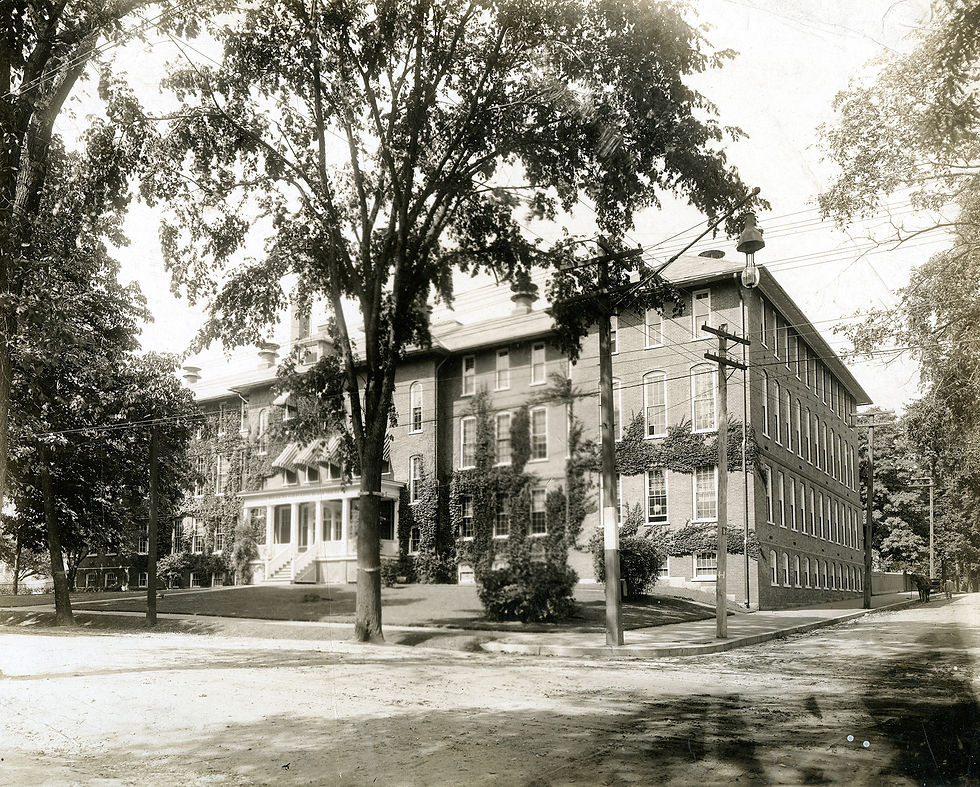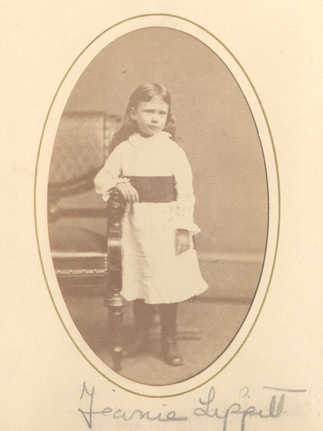The Lives and Connections between Jeanie Lippitt, Mary Ann Lippitt, and Alexander Graham Bell
- Guest Blogger
- Oct 30, 2024
- 4 min read
Updated: Nov 11, 2024
Editor's Note: This is the first in a series of posts about the Lippitts and the History of Equal Rights for Deaf Education. To read the introduction and overview of the series, please go here.
Jeanie Lippitt, born in 1852, was the daughter of Henry and Mary Ann Lippitt. Jeanie and her mother Mary Ann became important figures in the establishment of new schools for the Deaf in Rhode Island and Massachusetts.
Early Days: Speech Lessons at Home
At age four, Jeanie lost her hearing due to scarlet fever that took the lives of three of her siblings. Mary Ann began teaching Jeanie how to read lips and continue her speech. Every morning, Mary Ann tutored Jeanie for two to three hours getting her to read, spell, speak, and lipread. She would have Jeanie copy her mouth movements for certain words so Jeanie could understand how to speak and lipread at the same time (Taylor 2020). Determined, innovative, and committed, Mary Ann was driven by her desire to have her daughter remain in mainstream society, as she feared that using sign language would isolate her from the hearing public. Once Jeanie was able to communicate with her voice and understand people's lips, she went to a private school with hearing girls. There, with some accommodations in her curriculum, she remained a star student.
Left: Jeanie Lippitt (1852-1940) as a young child, photograph, c.1856-60.
Center: Mary Ann Balch Lippitt (1823-1889), photograph, c.1885.
Right: Alexander Graham Bell by Moffett Studio - Library and Archives Canada, C-017335, Public Domain, accessed 2024/09/24, (source)
Connections with Alexander Graham Bell
Mary Ann began to worry that her daughter’s voice sounded different, so she sent her for voice lessons in Boston with Alexander Graham Bell. Before his famous creation of the telephone, Bell was an instructor of vocal physiology, passionate about teaching deaf people to speak. He played a huge role in deaf education and later became a widely criticized figure by the signing Deaf community (Greenwald 2024). We will discuss his legacy in more depth in the last post of the series.
After taking lessons with Bell, Jeanie even played a part in his presentation of the telephone. In 1876, at the public demonstration of one of the first long-distance telephone calls between Boston and Providence, Jeanie spoke from the Providence stage, impressing the Boston audience with her ability to communicate orally as a deaf person (Soules 2024).
Bell was an adamant proponent of oralism. Oralism is the idea that deaf people should be taught primarily through oral language instead of sign language. Oralist education exclusively uses speech and lipreading. In the late 19th century, it became a more popular method of education to integrate deaf people into mainstream society, whereas sign languages were viewed as an inferior method of communication (Christensen 2019). Mary Ann Lippitt subscribed to those beliefs and became an advocate for oralism, because of Jeanie’s success communicating with hearing people through oral language (Taylor 2020).
Mary Ann and the Founding of RI School for the Deaf
Throughout Jeanie’s childhood, Rhode Island lacked a school for deaf children. Passionate about the prospect of deaf children accessing education and social integration, Mary Ann lobbied the state of Rhode Island to pay for the transportation costs for deaf children in RI to study at Boston School for Deaf Mutes (now Horace Mann School for the Deaf and Hard of Hearing), a public school adopting the oralist method.

To advocate for deaf education, Mary Ann had her daughter demonstrate her ability to communicate with hearing people in private meetings at Lippitt House, her home (Taylor 2020). Jeanie's excellent communication abilities and her mother’s activism proved to stakeholders that deaf students were worthy of education and could learn how to communicate with mainstream society. In 1876, Mary Ann founded the Providence Day School for the Deaf. Later in 1877, with the support of Mary Ann and then Governor Henry Lippitt, the Providence Day School transferred operations to the state of Rhode Island. The school adopted oralism exclusively until the 1970s (RIDeaf 2024).
However, today, oralism, which exclusively values English as the language of communication, isn't widely regarded as the teaching or communication method of choice for people who are Deaf or Hard of Hearing (Christensen 2019). Now, Rhode Island School for the Deaf uses a bilingual/bimodal communication style that supports student development in both ASL and written and spoken English (RIDeaf 2024). In the next post, we will explore this transformation from oralism to bilingual education in more detail.
Click #DeafEducation to find all the posts in this series.
Guest bloggers: Irene Zhiyi Chen AB Candidate ’25 Theatre Arts and Performance Studies and Education Studies, Eric Hadley AB Candidate '26 Theatre Arts & Performance Studies and Certificate in Intercultural Competence, and Grace Moore AB Candidate ‘25 Sociology and Education Studies, Brown University
References
Christensen, Dusty. 2019. “Clarke School: A Brief History of Oralism.” Daily Hampshire Gazette, January 11th. https://www.gazettenet.com/The-history-of-the-Clarke-School-and-oralism-22277690.
Greenwald, Brian H. “Alexander Graham Bell and His Role in Oral Education.” Disability History Museum, accessed on August 15, 2024. https://www.disabilitymuseum.org/dhm/edu/essay.html?id=.
Rhode Island School for the Deaf. “About RISD.” Accessed on August 15, 2024. https://rideaf.ri.gov/AboutUs/index.php.
Soules, Rebecca. “Her Mother’s Triumph: Jeanie Lippitt Weeden.” Rhode Tour, accessed on August 15, 2024. https://rhodetour.org/items/show/2.
Taylor, Carrie E. 2020. “The Lippitts of Rhode Island: Anti-suffrage and Female Political Activism.” Newport History, 93 (282): Article 5. https://digitalcommons.salve.edu/newporthistory/vol93/iss282/5.







Comments